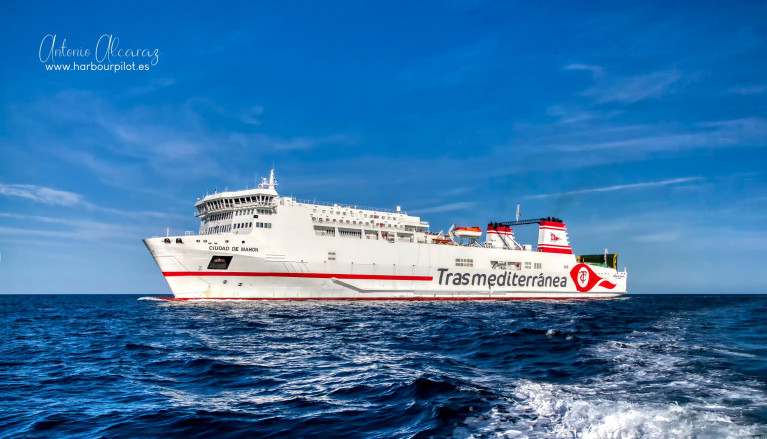Displaying items by tag: 2nd ferry acquired
ICG Acquire Another Ferry for Irish Ferries Dover-Calais Route to Enter Service in 2022
The Irish Continental Group (ICG) which owns Irish Ferries, has announced yet another recent acquisition, this time a Spanish-Balearic Islands passenger ro-ro ferry which will be their third ship to enter service on the Dover-Calais route, writes Jehan Ashmore
ICG entered into the agreement with Trasmed GLE for the purchase of the ropax ferry Ciudad de Mahón. Afloat tracked this morning the ferry at Palma de Mallorca, the port on the largest of the Balearics, Majorca from where the ropax serves the Spanish mainland port of Valencia.
Title to the 22,152 tonne Ciudad de Mahón will transfer to ICG on delivery which is expected to be implemented by late January 2022 and with the ro-pax ferry scheduled to commence services on the UK-mainland Europe route in the first quarter of next year.
The yet to be announced renamed vessel will serve the UK-France route after dry docking and rebranding changes. As Afloat previously reported, similar work is currently taking place with the former DFDS Calais Seaways (since renamed Isle of Innisfree), following ICG's purchase and delivery earlier this month, though is due in early December to join Isle of Innishmore which launched Irish Ferries debut on the route during the summer.
The newly acquired vessel was built in 2000 as Northern Merchant (Afloat adds for UK concern, Cenargo Group) by Astilleros Espanoles S.A. (AESA), Spain, to serve coincidentally out of Dover but running to Dunkerque with a charter to NorfolkLine. The ferry was one of a quartet of 'Race Horse' series built in Seville, with Midnight Merchant also on the Strait of Dover run, whereas the remaining pair served a Dublin-Liverpool service.
Passenger capacity is for 589 while freight is for 91 units of the ferry also previously named as Zurbarán. This will further boost freight capacity on the tightly competitive short-sea UK-mainland Europe link. The route also forms Irish Ferries 'landbridge' UK services, by connecting Ireland and the EU via ports in Wales.
Introduction of these two ferries by ICG, represents a total investment of €35.5m, alongside the Isle of Inishmore which completes previously announced plan by the Dublin based company to introduce three vessels on the premier Dover - Calais route.
With the third ferry in service, this will allow Irish Ferries to offer up to 30 sailings daily on the route with sailings in each direction approximately every 90 minutes.
























































